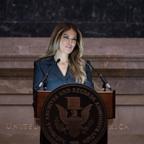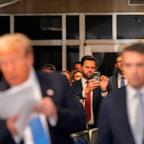Franken sworn in as Minnesota senator
WASHINGTON -- Al Franken was officially sworn in to the Senate on Tuesday, giving Democrats a 60-vote majority and prompting Republicans to repeatedly emphasize that Democrats are responsible for all that happens in Washington.
Using a Bible that belonged to late Minnesota Sen. Paul Wellstone, Franken said "I do" after Vice President Biden read the oath of office before an audience that included Franken's wife Franni and children.
Tuesday's swearing-in capped eight months of recounts and a protracted legal battle between Franken and incumbent Republican Norm Coleman, who conceded shortly after the Minnesota Supreme Court ruled in Franken's favor June 30. Franken defeated Coleman by 312 votes.
Senate Democrats celebrated Franken's admittance during its weekly closed-door lunch, which New Jersey Sen. Frank Lautenberg described as "jubilant" and "enthusiastic." The lunchtime crowd included former vice president Walter Mondale, a fellow Minnesotan who had escorted Franken to the Senate floor for the swearing-in.
The Senate's newest member "had a wonderful reception … especially because of the ordeal he survived," Lautenberg said.
The Democrats' 60-vote majority will prevent Republicans from blocking controversial bills and nominations. Senate Minority Leader Mitch McConnell and other GOP leaders marked the occasion by seeking to shift responsibility of government action to Democrats.
"Our Democratic friends now have their long-sought 60 votes," McConnell told reporters. "The American people will fully understand that they own the government, the executive branch, the House, and the Senate. And they're waiting to see the results of their programs."
Senate Majority Leader Harry Reid said he would like to cooperate with Republicans, saying Democrats need more than just their new filibuster-proof majority to advance key issues.
However, Texas Sen. John Cornyn, chairman of the National Republican Senatorial Committee, said the Democrats' call for bipartisanship did not ring true. "It's one thing to invite us to the table, but we have seen precious little of that," he said.




